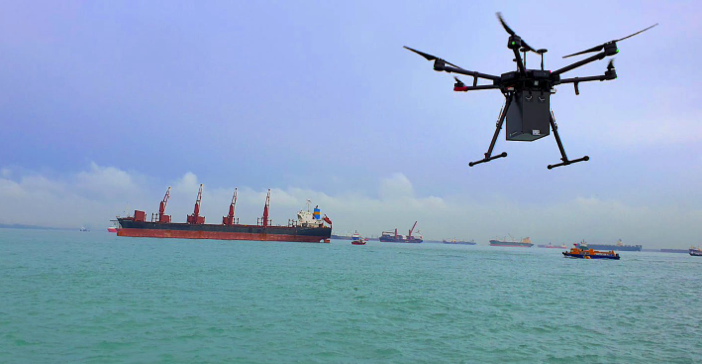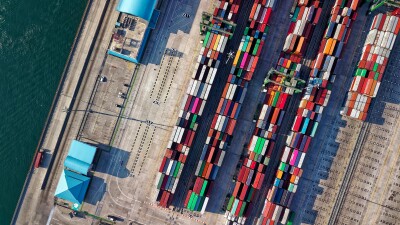The potential impact that drone technology might enable in the maritime industry around applications that range from security to search and rescue to delivery have been discussed in great detail. Drones can make tasks associated with all of these applications that much faster, cheaper or safer while opening up a whole new operational paradigm.
However, many of these applications are being developed for use in maritime by companies that are focused on various industries or are committed to developing numerous use cases. F-drones is singularly focused on the maritime industry, as the company is building the world’s first transition drone to enable aerial deliveries to ships and offshore platforms. A recent update highlights what kind of progress they’ve been able to make as a result of this focus.
F-drones made news by completing the first commercial drone delivery in Singapore. The drone delivered 2 kg of vitamins over 2.7 km in 7 minutes, to a ship managed by Eastern Pacific Shipping (EPS). EPS is F-drones’ first paying customers but also one of the world’s largest privately-owned ship managers.
It’s an important development as a normal delivery by boat of this sort could require double the time. Without a drone, the item may also need to be carried onto the vessel by hand. The potential cost and logistical implications in maritime if stakeholders can send 100kg loads over 100km to ships and offshore platforms are stark, and F-drones has mentioned that could mean a reduction of up to 80% in costs. But what would those reductions actually look like?
“Globally, the average cost of a delivery by boat would be around US $1,500,” said Nicolas Ang, CEO & Co-founder of F-drones. “With our 100kg-100km drone, customers can expect at least 30% savings, and with our 5kg-50km drone, it is not going to cost more than $300 per delivery. This is going to be disrupting those deliveries that do not require a whole boat. For instance, with the smaller drone, we can send items such as documents, spare parts, medicine and bunker samples.”
In providing an alternative transportation option to small boats, F-drones is creating options and opportunities that can be expanded across the maritime industry and the entire world. The Maritime Drone Estate initiative by the Civil Aviation Authority of Singapore and Maritime Port Authority have provided the company with an ideal setup to prove what kind of results their solution can enable.
Those results are being recognized by some of the biggest companies in the space including EPS as well as Hafnia, a product tanker company. These companies are looking to quantify the difference F-drones technology might make to their business, and the results have them excited.
“We have been fortunate to work with forward-thinking companies such as EPS and Hafnia, which are keen to be on our learning journey together,” Ang told Commercial UAV News. “This is also in part because they see the potential of our solution to make their maritime logistics cheaper, faster and greener.”
Delivery via drone has been a topic of discussion for a long time now, but the deliveries that F-drones is performing illustrate how the potential of such applications is becoming reality. As more companies and entire industries work to enable drone deliveries in light of the COVID-19 pandemic, more and more use cases like the ones from F-drone will define what the future of drone delivery looks like in maritime and beyond.















Comments